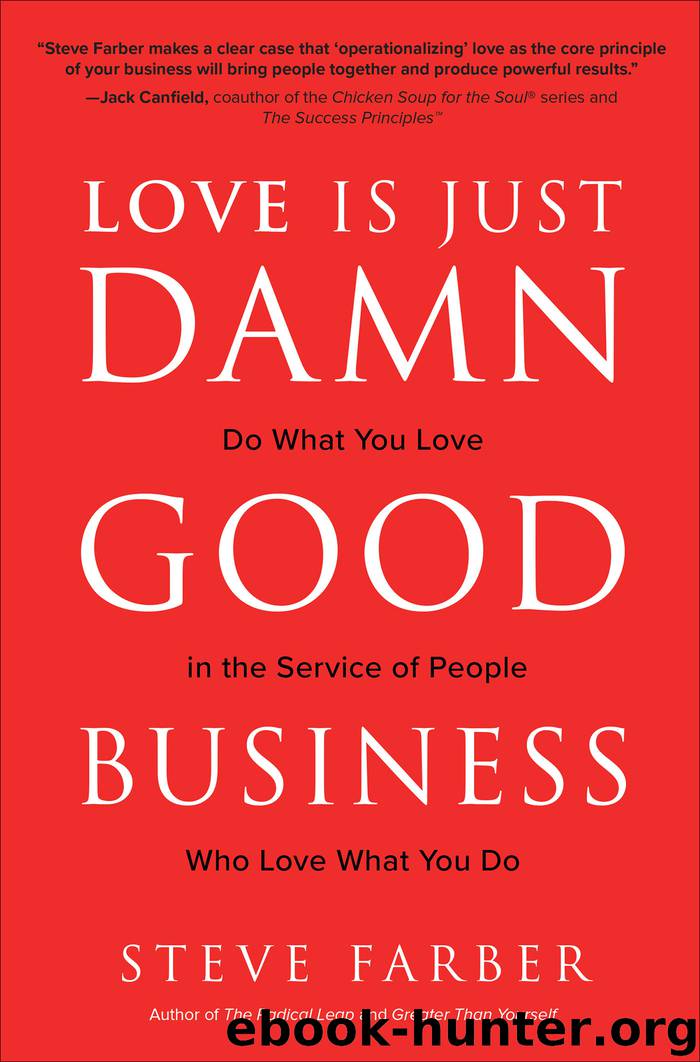Love is Just Damn Good Business by Steve Farber

Author:Steve Farber
Language: eng
Format: epub
Publisher: McGraw-Hill Education
Published: 2020-03-10T16:00:00+00:00
LONNIE GOLDEN, PENN STATE UNIVERSITY
One of the most important gifts we give the people we love is the gift of trust. When we give trust, people feel respected and cared for—they feel like our love for them is somehow contributing to a higher quality of life.
There’s an organizational component to serving people we love by giving them our trust. As Extreme Leaders, we need to look at the organization and the way it’s structured—the systems, policies, procedures—that allow that trust to happen more readily with people.
Lonnie Golden, my friend since we were smart-ass kids at summer camp, researched the relationship between work hours and happiness. Golden is a professor at Penn State, and he is one of those rare labor economists who thinks about happiness at work. His research reveals that your work-related happiness (or “utility,” to use the academic lingo) in large part boils down to having more control over your work hours.1 Money matters, of course, but only to a point.
“When your income is really low,” Golden told me, “it’s amazing what doubling your income does for your well-being. But if you’re already making a million dollars, making another million isn’t going to double your utility. It still adds to your utility, but by much less than for someone who started with very little.”
Control of your time, on the other hand, is always a big deal. Golden and his research colleagues (Julia Henly and Susan Lambert) have found a strong connection between happiness and the freedom to manage your work time to fit your needs. Since happy workers are productive workers, one way we can serve the employees we love is by trusting those employees to come and go as they please.
What does this look like? Well, it depends on the needs of the people involved. For some, it might be allowing them to work from home two days a week. Others might need to work a split shift so they can get their kids to and from school. Or they might need to work fewer hours during a particular phase in life. Or have Thursday afternoons off to go watch their kid play soccer.
Golden told me that flextime is both a productivity tool and a reward. It’s typically a reward for the highest-performing employees, but it also can enhance performance. Granting employees greater control of their schedules might not make everyone more productive for every hour of every day, but it fosters an atmosphere of gratitude and trust that typically leads to productivity.
It also helps build a culture of reciprocal trust. When you say, in essence, “I trust you to get the job done,” you tangibly and dramatically demonstrate how much you trust someone to be responsible, and you’re much more likely to see that trust returned to you. When people feel happy and feel trusted, they are far more likely to stick around and work with passion.
I have a friend who works for Google (a “Googler,” as they call themselves). It’s very much a performance-based culture, but he has full control over his work schedule.
Download
This site does not store any files on its server. We only index and link to content provided by other sites. Please contact the content providers to delete copyright contents if any and email us, we'll remove relevant links or contents immediately.
| Direct | Global |
| Industrial | Multilevel |
| Product Management | Research |
| Telemarketing | Web Marketing |
Influence: The Psychology of Persuasion by Robert B. Cialdini(4178)
The Miracle Morning by Hal Elrod(3909)
The Hacking of the American Mind by Robert H. Lustig(3579)
Pre-Suasion: A Revolutionary Way to Influence and Persuade by Robert Cialdini(3413)
Unlabel: Selling You Without Selling Out by Marc Ecko(2981)
Hidden Persuasion: 33 psychological influence techniques in advertising by Marc Andrews & Matthijs van Leeuwen & Rick van Baaren(2777)
Who Can You Trust? by Rachel Botsman(2732)
Kick Ass in College: Highest Rated "How to Study in College" Book | 77 Ninja Study Skills Tips and Career Strategies | Motivational for College Students: A Guerrilla Guide to College Success by Fox Gunnar(2719)
Purple Cow by Seth Godin(2697)
Ogilvy on Advertising by David Ogilvy(2682)
I Live in the Future & Here's How It Works by Nick Bilton(2524)
This Is Marketing by Seth Godin(2482)
The Marketing Plan Handbook: Develop Big-Picture Marketing Plans for Pennies on the Dollar by Robert W. Bly(2413)
The Power of Broke by Daymond John(2376)
Building a StoryBrand by Donald Miller(2360)
The 46 Rules of Genius: An Innovator's Guide to Creativity (Voices That Matter) by Marty Neumeier(2308)
Draw to Win: A Crash Course on How to Lead, Sell, and Innovate With Your Visual Mind by Dan Roam(2277)
The Tipping Point by Malcolm Gladwell(2204)
Market Wizards by Jack D. Schwager(2163)
